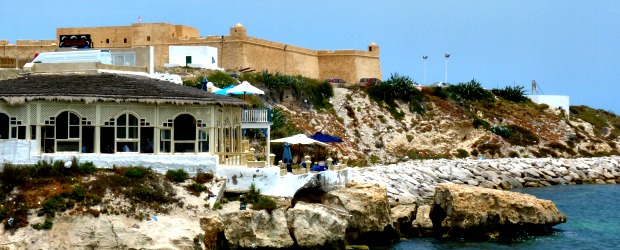You have no items in your cart. Want to get some nice things?
Go shopping
My boyfriend and I had been told that the coastline of Mahdia was the most beautiful in the Sahel region of Tunisia. Its name contains an “h” sound like the English “h” in rehearse. This was not to be confused with the other kind of “h,” a heavily aspirated sound (represented in Arabic chat alphabet by the number seven) that requires you to exhale like fogging your glasses when you say it. I’d learned how to do that over the past year I’d spent studying Tounsi, the Tunisian dialect of Arabic.
On a hot Sunday in June near the end of my Fulbright grant, we rented a car and headed south from our home in Sousse along the coastal rode. By the time we arrived in Mahdia, we were sweaty and hungry. I wanted to go directly to the picturesque café I’d read about—the one built into the rocks, with stairs leading right down to the sea. We passed city hall, the mosque, a produce market, but still no resplendent café. The sun was beating down.
“Let me just ask,” I told David and boldly strode over to an elderly man in a natty jacket sitting at the entrance to the port. Like many older men, he had a circular callous on his forehead from repeated contact with the prayer mat. This gave me some confidence: Elderly men with prayer marks had always been kind.
“Sama7ni, Sidi. Brabbi, win 9ahwet Sidi Salem?” Excuse me, Sir. Please, where is the Sidi Salem Café?
He gave me a blank look.
I showed him the guidebook in my hand, pointing to the place on the map where the café was supposed to be—right where he was sitting. But there was a ticket to the Grand Mosque in the holy city of Kairouan, two hours away, stuck inside the book. He got distracted, pulling the ticket out and turning it over to examine it.
“T3araf 9ahwet Sidi Salem?” I tried again, hoping to focus his attention. Do you know the Sidi Salem Café?
“Qu’est-ce que vous cherchez? Un bateau, un garçon?” What is it that you’re looking for—a boat? A boy? He seemed unable to comprehend that I was not addressing him in French, since French was clearly what my appearance as a white lady suggested. Tunisia had been a colony until 1956.
“Lé!” I said, getting exasperated. My pronunciation was not that bad. “9ahwa! 9riba min lehne. Famma 9ahwa 9riba lehne? Bi jneb el-b7ar?” No! Café! Close to here. Is there a café close to here? Next to the sea?
He looked at me as though I was spouting pure gibberish. But I knew the words were correct; I’d practiced this very dialogue in my Tounsi lessons. So I started miming, pinching my thumb and index finger together as though bringing a tiny espresso-sized cup to my mouth.
“9AHWA!” he exclaimed. He launched into a lengthy recommendation in French for a very nice garden café, the directional details of which were lost to me. I did not speak French.
“Ok, behi, 3ayshik, Monsieur,” I told him. Thanks for nothing.
We walked for ten minutes back toward the mosque, and a little farther on, we saw a café built into the rocks with a big sign out front that said Sidi Salem. Sure enough, children were splashing in the clear blue water at the end of the stone staircase. We sat on the terrace, with the breeze blowing off the water, and ate chicken sandwiches stuffed with French fries and slathered with harissa. It was heavenly.
I remembered a story I’d been told about an African American student at Berkeley who was fluent in Japanese. He would sidle up to groups of Japanese tourists on campus and address them in their native language, waiting for the shock and amazement that would follow. Perhaps the guy at the port was experiencing a kind of cognitive dissonance at hearing me speak Arabic.
When I mentioned the experience to a Tunisian friend later, he said, “We are so used to speaking other people’s languages: French, of course, German, Italian, Spanish, English. We don’t expect it when a foreigner comes to speak to us in our own language. It’s very strange.”
He was right—the Tunisians I knew were incredible polyglots. Their heritage contained so many cultures: Punic, Roman, Ottoman, Arab, Berber, French, Italian. He said that the French, especially, wanted Tunisians to speak their language. He regretted that Tunisians were still learning all their school subjects in French.
My expat friends had asked why I didn’t study French, since it would be useful to me in other countries while Tounsi would not. But I had been rewarded for my efforts when I spoke with vendors at the souk or taxi drivers who took me to the university where I taught each day.
That’s not to say it wasn’t difficult. I am a shy person by nature. Stumbling along in a new language made me feel like a child. I was often exhausted by the sheer effort. But every now and then a flash of connection with another human being—someone whom I couldn’t have spoken to at all a year before—would give me the confidence and will to continue.
Only later, on the return trip to Sousse, did I realize what the man in the natty jacket had said when I’d thanked him. “Min gheer mziya.” No problem. He had answered me in Tounsi.
Litro’s mission is to find the best and most exciting new voices in fiction and non-fiction and give them a platform for their work. To read work from other writers to watch, get our All-Access membership for subscription to our print magazine, membership of our Book Club and unlimited online access.

About Andrea Calabretta
Andrea Calabretta is a writer and editor based in Philadelphia. She is currently at work on a book about her experiences in Tunisia during the so-called Arab Spring.




A very good article! I can feel the warmth of the culture through your genuine interactions, Andrea.
I can’t wait to read your book and learn more about your adventures! :-)
A very good article! I could feel the warmth of the culture through your interactions, Andrea :).
Looking forward to reading more about your Tunisian experience.